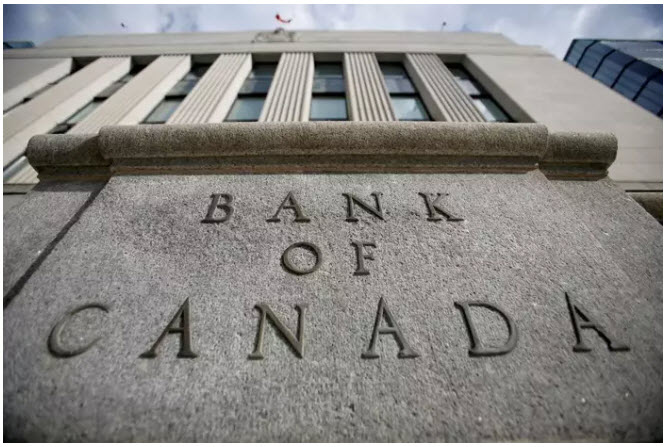(Reuters) – The Bank of Canada is set to raise its overnight rate by a hefty 75 basis points this month and by another 50 in September, front-loading a campaign to take monetary policy to where it will restrain the economy, according to a Reuters poll of 29 economists
For now, the central bank is keeping up with aggressive moves by the U.S. Federal Reserve, which is also attempting to rein in inflation running at a four-decade high.
But the June 30-July 6 survey suggests the BoC will halt earlier than the Fed, pausing throughout next year in part as deeply indebted Canadian households are more vulnerable to higher borrowing costs.
Still, over 90% of respondents, 27 of 29, said the BoC, which already delivered back-to-back 50 basis point hikes at its previous two meetings, will deliver a 75 basis point hike to 2.25% on July 13 following a similar move at the Fed’s June meeting.
That would be the biggest rise since August 1998, when the BoC lifted rates by 100 basis points to defend the Canadian dollar during a time of turmoil in global currencies.
The BoC will hike again by 50 basis points in September, according to a significant majority of economists, taking the overnight rate to 2.75%. That is well into a neutral range – where the economy is neither stimulated nor restricted by policy – estimated at 2-3% by economists in the poll.
Most respondents said the BoC will dial down the size of its hikes to 25 basis point increments or lower in October and December, taking the rate to 3.25% by year-end, in line with interest rate futures. But over one-quarter of poll respondents predicted the year-end rate to be higher than that.
“We now look for the Bank of Canada to hike to 3.25% by October 2022, with a 75 basis point hike in July followed by a pair of 50 basis point hikes in September and October,” noted Robert Both, macro strategist at TD Securities.
“Household leverage makes it unlikely that the Bank will be able to move as far as the Fed,” he added.
The BoC is expected to pause throughout next year even as the Fed carries on raising rates. [ECILT/US]
Inflation was expected to cool significantly from a near 40-year high of 7.7% in May to 2.2% by the fourth quarter of next year, according to the poll, as recession risks rise.
At its April meeting, the BoC predicted inflation would ease to 2.5% in late 2023.
The survey showed a median 35% chance of recession within a year, rising to 40% over the next two years.
After contracting 0.2% in May, the economy was predicted to slow significantly and grow at less than half the annualised 4.2% pace forecast for the second quarter from the third quarter onward.
The housing market, meanwhile, has already shown signs of a rapid slowdown, albeit after eye-watering double-digit rises during the past two years during the pandemic.
All economists but one responding to an additional question said the cost of living crisis would not ease significantly for at least six months.
“There has been some offset from the large pile of savings accumulated during the pandemic and that’s kind of cushioning the inflation pain,” said Sal Guatieri, director and senior economist at BMO.
“But eventually that will wear off and we will see high inflation curbing spending even more dramatically in the year ahead.”




